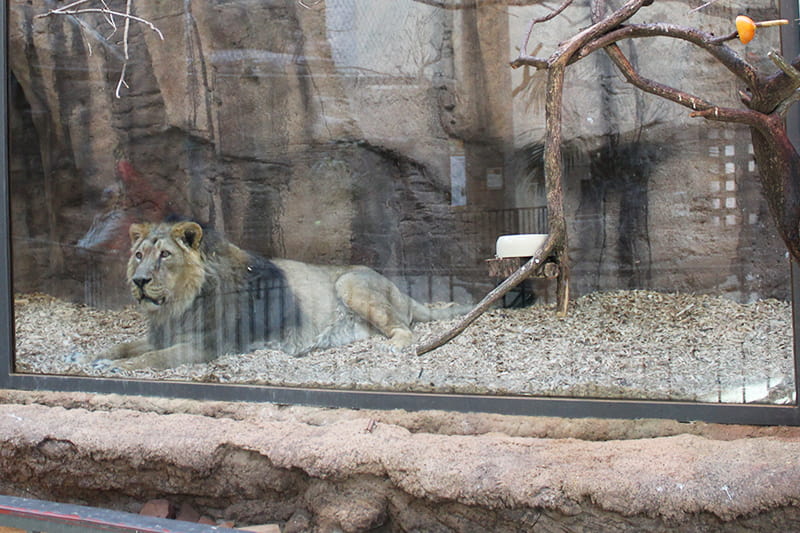Do zoos make sense and are they even up to date? This question is more than justified at the latest after the fire in the monkey house at Krefeld Zoo, where 50 animals died in agony.₁ And is keeping animals in zoos in confined spaces even appropriate for the species? It's time we compared the pros and cons and considered whether keeping animals in zoos is still necessary these days.
In this article I would like to introduce you to the reasons for the existence of zoos and the serious disadvantages. You will also learn about the alternatives to zoos.
Here is another short Table of contents for you:
Why might keeping animals in zoos make sense?

It is important to first be aware of why zoos are so popular in our society and what purpose they serve. Therefore, here I present some pro-arguments for keeping animals in zoos, which are often mentioned. If it is easy for me, I will also write a possible counter-argument to justify why zoos might not be up to date anymore.
Impart knowledge about animals
In lectures or through information boards and films, we are supposed to learn more about wild animals. In the confined zoo, however, the animals do not behave as they do in the wild. A false image could arise.
Promote species conservation
Zoos are supposed to act as a kind of catchment basin for later release into the wild, giving the Species Extinction counteract. Nevertheless, animals lose their natural instincts in the zoo, so that they can only be released with difficulty or not at all. The designation "living animals of wild species for the purpose of display" from §42 of the Federal Nature Conservation Act shows that keeping animals in zoos actually has a different purpose.
Awaken enthusiasm for animals
Many people, especially in big cities, see few animals in their daily lives. In zoos, they can view elephants, lions, tigers, giraffes, monkeys, sharks, moray eels and many other wild animals. Zoos can thus increase enthusiasm for nature and wildlife. This can possibly attract more people to it, Actively help animals in everyday life.
Children get to know animals
Zoos have the advantage that children can get to know animals in close proximity to where they live. However, animals in captivity tend to be behaviorally disturbed, so that a false image could be conveyed. In addition, there are alternatives for zoos, which I will present to you in a moment.
Lucrative entertainment business
Zoos are commercial enterprises that create jobs and must therefore be profitable. The animals in the zoo should entertain people and bring a smile to their faces. Unfortunately, this often leads to the phenomenon that zoos breed more animals than they can accommodate. The new polar bear offspring attracts an above-average number of visitors.
Zoo animals for research purposes
Zoos also have the purpose of facilitating research on animals that are actually wild. Much of what we know about wildlife today comes from observations and studies of zoo animals. However, because animals in zoos cannot behave as they would in the wild, research opportunities are very limited.
Notice: This article is a discussion about "whether zoos are still up to date". Therefore, I am very critical of the PRO side in particular. Feel free to add more arguments for zoos in the comments.
Why might zoos be out of touch with the times?
In Germany, there are about 300 large and medium-sized zoos and animal enclosures.₂ However, when it comes to the advantages of zoos, it has already become apparent that the purpose of their existence has largely been overtaken. We should determine whether zoos are still up to date based on the severity of the disadvantages and consequences. These I now present to you.
Cruelty to animals in zoos
Cheetahs can't sprint, elephants can't walk. But cruelty to animals is not the only reason to be critical of zoo keeping, because wild animals have too little space there and cannot basically be kept in a manner appropriate to their species. Animals are also forced to perform tricks to entertain zoo visitors. For example, baby elephants are tortured with so-called "elephant hooks" to make them spur.₆ Animals in zoos thus suffer physical pain.
Animals in the zoo are defenseless
For one thing, wild animals have no choice. They are anesthetized in the wild and locked up in the zoo. For another, they are defenseless in their enclosures in the event of disasters like the fire at Krefeld Zoo.
Zoochose: Animals in captivity reveal psychotic behavioral disorders. Polar bears, for example, run in circles and elephants make the typical bobbing motion with their heads. This is a mental pain that the emotional animals suffer.
Animals are snatched from wilderness
Many animal species cannot reproduce at all in captivity and under poor husbandry conditions. Therefore, inbreeding is often necessary to increase the population in the zoo, which can lead to deformities. Zoos will therefore, as long as they exist, always "take" on animals from the wild.
Zoo animals pose danger to employees
Time and again, zoo employees are injured or killed by the wild animals following their natural instincts due to human error.₃ If wild animals lived where they belonged, they could fulfill their hunting instincts for antelope or buffalo.
Zoos also kill healthy animals
If a zoo simply has too many animals and cannot accommodate them all, healthy animals are also killed. This is called population management. The killing of the young giraffe Marius at Copenhagen Zoo₄ or the clandestine killing of two Sunda oxen at Hellabrunn₅ Zoo, for example, caused a worldwide sensation.
Besides, zoos are also pretty expensive, don't you think? Can you think of any other arguments against zoos? Then feel free to write me a comment under this post.
If zoos don't make sense - what are the alternatives?
For us humans, therefore, there are mainly moral reasons to rather ban animals in zoos. Whether zoos are timely and sensible or not, we should ultimately also depend on the possible alternatives with which we can also get our money's worth and bring children closer to the animal world. Here are some examples that can offer the advantages of zoos without the serious disadvantages:
- Wildlife parks: There are numerous game parks and game gates in Germany that combine nature and environmental protection with real nature experiences and large-scale, species-appropriate keeping of animals. In the Schorfheide Game Park north of Berlin, for example, you can see elk, red deer, bison and even lynx.
- Mercy Farms: So-called life farms lovingly rescue and shelter (farm) animals that would otherwise have been slaughtered or euthanized. Whether dogs, pigs, cows, horses or chickens. Throughout Germany, you can build real connections with animals that behave completely naturally.
- High Seats: Few things are more exciting than observing the evening activities of animals native to Germany from a raised hide. Just ask foresters and hunters about the use of their raised hide and for recommendations for certain times with high chances of success.
- Walks: Isn't it just much more exciting to observe animals in their natural behavior rather by chance? Even on normal walks over hill and dale you have the chance to do this.
Can you think of other alternatives for zoos? Then just write me a comment. I will gladly take up your ideas.
Conclusion: do zoos make sense and are they still up to date?
After my research I am sure: No, zoos are neither sensible nor contemporary. I do better without zoo visits and use the sensible alternatives to seek contact with animals that are really kept species-appropriate. I therefore also convince friends and acquaintances with honest and contemporary arguments not to go to zoos anymore. In the end, however, everyone must judge for themselves whether the keeping of animals in zoos is contemporary and ethically justifiable.
What is your opinion about zoos? Do you consider zoos to be contemporary and meaningful, or not? Feel free to write me a comment below this post.
Be always kind to animals,

PS.: Look with pleasure times in the animal welfare blog by! There you can find for example recommendations for Documentaries about factory farming and make up your own mind about it.
References:
₁ V. Arnold; M. Lippl; et al: Ape House in Krefeld: Shocking Details on Fire Disaster on New Year's Eve (as of Feb. 19, 2020), available at https://t1p.de/9z7z. [01.04.2020].
₂ Wikimedia Foundation Inc: Zoo in Germany, available at https://de.wikipedia.org/wiki/Kategorie:Zoo_in_Deutschland. [01.04.2020].
₃ AXEL SPRINGER SE; BILD: Zoo director: "It happened in a flash" (as of Sept. 20, 2013), available at "https://www.bild.de/news/inland/tierattacken/tiger-attacke-32467238.bild.html. [01.04.2020].
₄ THE GUARDIAN: Marius the giraffe killed at Copenhagen zoo despite worldwide protests (as of Feb. 09, 2014), available at https://www.theguardian.com/world/2014/feb/09/marius-giraffe-killed-copenhagen-zoo-protests. [01.04.2020].
₅ M. Bernstein; Süddeutsche Zeitung: That's why the young Banteng cops had to die, available at https://www.sueddeutsche.de/muenchen/tierpark-hellabrunn-darum-mussten-die-jungen-banteng-bullen-sterben-1.3704557 [01.04.2020].
₆ PETA Deutschland e.V.: Zoo Hannover tortures baby elephants (as of April 2018), available at https://www.peta.de/zoo-hannover. [01.04.2020].





Hello Christoph,
I am torn, as a child I loved the zoo very much, now I have a more critical attitude. What I find difficult about your contribution is the generalization. From individual cases you make "In the zoo healthy animals are killed" or "In the zoo animal babies are tortured" and also your alternatives, instead of seeing a tiger itself, one should simply sit on a high seat (which is unfortunately not permitted so easily), do not work for me.
I don't think zoos should be banned. They provide, if they are really concerned about the animals, an educational basis, contributions to species conservation and a nice destination for excursions. Only they should not exhibit all the animals of the world, but those to which they can offer adequate living conditions.
Love greetings
Moin Christoph, thank you for your comment! Of course, not every zoo acts so brutally, but it can never be excluded - and closing animals is also morally questionable.
The zoo may be a nice destination for you - but it's not nice for the caged animals. And there are better ways to educate yourself about exotic wildlife than to see them in a non-natural environment.
Can you name me one animal that finds "adequate living conditions" in a zoo?
"Zoo-yes-or-no" is definitely an emotional topic. I look forward to your response and have a great week.
Best regards
Christoph
PS: You are not allowed to go to the high seat, but you can ask for permission. It usually works out 🙂
Hello, thank you for your thoughts.
I don't think you can look at it in such black and white terms. Almost all the points mentioned can be broken down to the question of how. And the problem is that zoos have to be economically profitable - a purely capitalistic problem.
If zoos were taken out of the free market, their operation reformed, and presumably their numbers limited (300 zoos? Wow, I didn't know that. Probably 10 would be easy enough for Germany), it would be possible to create an approximately species-appropriate environment. That means above all: larger enclosures, no overbreeding and no more animal shows.
What you say is true, of course, cheetahs want to sprint and elephants want to hike. For this they need much more space.
But you also have to look at the animal species in a more differentiated way. For example, I believe that crocodiles or snakes will generally have fewer problems with the size of their terrariums.
The alternatives you mentioned are unfortunately no real substitute. Sure, it's nice to see animals in their natural environment. But while waiting for the deer, most children will soon lose their patience and thus their interest in the animal. Sitting at the edge of the forest for hours without anything exciting happening doesn't beat mobile games, unfortunately. Apart from that, the animal experience is "only" limited to the usual forest dwellers, even if the game is successful. Who has the money to fly to Kenya for a safari? (in addition, there would also be the flight emissions).
Unfortunately, some animal species can only be seen in zoos. But zoos should definitely have to look less at profit and focus more on education and research.
Hello Moritz! I prefer to ask myself the question of IF, rather than HOW. There are certainly animal species that can cope with smaller enclosures. But why do we humans take the right to confine and "exhibit" animals at all? Our children get to know animals in a different way. Certainly not in the same way, but in an animal-friendly way.
Many greetings
Christoph
Thank you for your great suggestions for critical thinking. I used to think zoos were great. Now I'm wondering whether we really still need them. Yes, it's fun to look at all the different animals. But at what price. If you imagine being in their place yourself, it would be traumatizing without end. Yes, you might bring it closer to children. But shouldn't children be taught how to handle animals properly?
Thank you for this comparison of the arguments. I think it is still very widespread that zoos are not so bad.